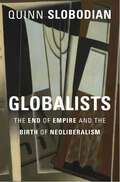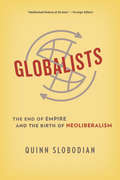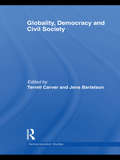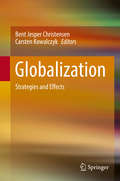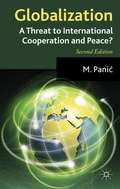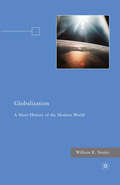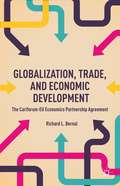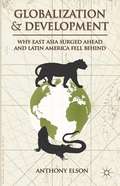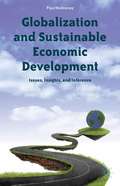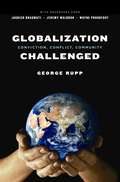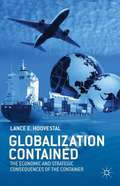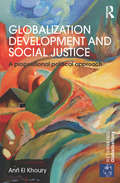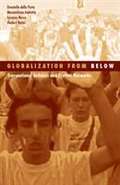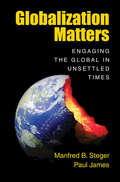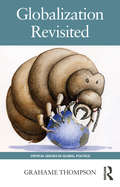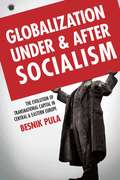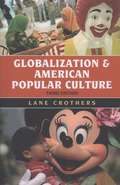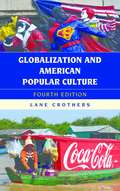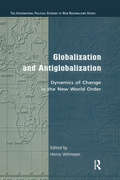- Table View
- List View
Globalists: The End of Empire and the Birth of Neoliberalism
by Quinn SlobodianNeoliberals hate the state. Or do they? In the first intellectual history of neoliberal globalism, Quinn Slobodian follows a group of thinkers from the ashes of the Habsburg Empire to the creation of the World Trade Organization to show that neoliberalism emerged less to shrink government and abolish regulations than to redeploy them at a global level. Slobodian begins in Austria in the 1920s. Empires were dissolving and nationalism, socialism, and democratic self-determination threatened the stability of the global capitalist system. In response, Austrian intellectuals called for a new way of organizing the world. But they and their successors in academia and government, from such famous economists as Friedrich Hayek and Ludwig von Mises to influential but lesser-known figures such as Wilhelm Röpke and Michael Heilperin, did not propose a regime of laissez-faire. Rather they used states and global institutions—the League of Nations, the European Court of Justice, the World Trade Organization, and international investment law—to insulate the markets against sovereign states, political change, and turbulent democratic demands for greater equality and social justice. Far from discarding the regulatory state, neoliberals wanted to harness it to their grand project of protecting capitalism on a global scale. It was a project, Slobodian shows, that changed the world, but that was also undermined time and again by the inequality, relentless change, and social injustice that accompanied it.
Globalists: The End of Empire and the Birth of Neoliberalism
by Quinn SlobodianDo neoliberals hate the state? In the first intellectual history of neoliberal globalism, Quinn Slobodian follows neoliberal thinkers from the Habsburg Empire’s fall to the creation of the World Trade Organization to show that neoliberalism emerged less to shrink government and abolish regulations than to deploy them globally to protect capitalism.
Globality, Democracy and Civil Society (Democratization Studies)
by Terrell CarverGlobality, Democracy and Civil Society explores the relationship between the concepts of democracy and civil society through a comparison of their meaning and function in different historical and cultural contexts. This volume presents detailed contextual studies in Europe, North America, Japan, Russia and Turkey. The contributors explore different ways of understanding and developing democratic practices and institutions. Rather than projecting the conditions of modern representative, state-centric democracy onto the global realm, they propose ways of rethinking these very conditions in terms of human diversity and difference. This is done by exploring conceptions of democracy that reconcile cultural plurality with democratic practices, and by using a number of examples and perspectives framed by a global context, rather than by geographical divides between East and West. The contributors are not trying to define the concept of civil society, but rather demonstrating the different ways it is deployed in political practice and disseminated through on-going processes of globalisation. This book will be of interest to scholars and students of global democracy and governance, cosmopolitan democracy, the future of civil society in a globalising world, comparative politics and political thought.
Globalization
by Arjun AppaduraiEdited by one of the most prominent scholars in the field and including a distinguished group of contributors, this collection of essays makes a striking intervention in the increasingly heated debates surrounding the cultural dimensions of globalization. While including discussions about what globalization is and whether it is a meaningful term, the volume focuses in particular on the way that changing sites--local, regional, diasporic--are the scenes of emergent forms of sovereignty in which matters of style, sensibility, and ethos articulate new legalities and new kinds of violence. Seeking an alternative to the dead-end debate between those who see globalization as a phenomenon wholly without precedent and those who see it simply as modernization, imperialism, or global capitalism with a new face, the contributors seek to illuminate how space and time are transforming each other in special ways in the present era. They examine how this complex transformation involves changes in the situation of the nation, the state, and the city. While exploring distinct regions--China, Africa, South America, Europe--and representing different disciplines and genres--anthropology, literature, political science, sociology, music, cinema, photography--the contributors are concerned with both the political economy of location and the locations in which political economies are produced and transformed. A special strength of the collection is its concern with emergent styles of subjectivity, citizenship, and mobilization and with the transformations of state power through which market rationalities are distributed and embodied locally. Contributors. Arjun Appadurai, Jean Franois Bayart, Jrme Bind, Nstor Garca Canclini, Leo Ching, Steven Feld, Ralf D. Hotchkiss, Wu Hung, Andreas Huyssen, Boubacar Tour Mandmory, Achille Mbembe, Philipe Rekacewicz, Saskia Sassen, Fatu Kande Senghor, Seteney Shami, Anna Tsing, Zhang Zhen
Globalization
by Bent Jesper Christensen Carsten KowalczykThis volume uses cutting-edge theory and empirical analysis of channels of international interaction to build new knowledge about strategies of entrepreneurs, domestic and multinational firms, governments, and international organizations facing increasing globalization. The ongoing process of globalization implies the continuing expansion and intensification of economic, political, social, cultural and judicial relations across borders. It is furthered by reductions in transportation and communication costs, the rise of new information technologies, such as the internet, and liberalizations in the markets for goods, services, labor, capital, and technology. Globalization presents new opportunities to some, but risks and threats to others. The volume presents new research and findings by leading scholars on international trade, labor markets, financial markets, economic integration, political science, law, management, the humanities, developing countries, and international relations.
Globalization
by M. PanicGlobalization and National Economic Welfare makes an original, powerful and timely contribution to a highly topical issue that affects all countries by showing why globalization is unsustainable in the long term without fundamental changes in existing attitudes and institutions. The book analyzes one of the most important aspects of economic policy at the beginning of the twenty-first century: how to overcome the growing threat that inequalities created by globalization pose to economic progress and political stability both nationally and internationally. Economic problems, from corporate fraud and bankruptcies to the high social costs of the adjustments that globalization imposes on individual countries, are becoming increasingly international and, consequently, demand action at the supranational level. Yet the effective institutional framework for dealing with these problems remains national. In contrast to the neo-liberal approach, the author argues that the state, as the only form of organization that has the power to reconcile conflicts of interest nationally and internationally, has a critical role to play in ensuring that globalization does not end in failure and war.
Globalization
by William R. NesterHow did globalization come to dominate our lives? What have been, are, and most likely will be globalization's potential benefits and costs? This book explores the world's most powerful force for good and evil from the Renaissance through today and beyond.
Globalization , Trade , And Economic Development
by Richard L. BernalThis is the most in-depth study of the economic partnership between the European Union and the CARIFORUM countries, a group of fifteen small developing economies in the Caribbean. The CARIFORUM-EU Economic Partnership Agreement (EPA) is the first trade agreement of its kind, as it is a new type of WTO-compatible trade agreement between a group of developed countries and a group of developing countries. As a principal negotiator for CARIFORUM, Bernal's qualifications allow him to provide a unique perspective on the increasingly important topic of trade and economic development in the midst of globalization. Globalization, Trade, and Economic Development comprehensively explores the components of the EPA from all angles, explains how the agreement provides opportunities to strengthen and accelerate economic development, and outlines the policies which can allow the CARIFORUM countries to seize these opportunities. Bernal's explanation of the institutional arrangements for the conduct of the negotiations by CARIFORUM is invaluable to governments and regional organizations in developing countries for coordinating groups to advance common and joint positions in international negotiations.
Globalization And Development
by Anthony ElsonWhy has there been such a pronounced divergence in the economic fortunes of developing countries? Comparing the experiences of East Asia and Latin America since the mid-1970s, Elson identifies the key internal factors common to each region which have allowed East Asia to take advantage of the trade, financial, and technological impact of a more globalized economy to support its development, while Latin America has not. Unique in its comparative regional perspective and grounded in an inter-disciplinary approach, this work is a timely addition to our understanding of the future of economic development.
Globalization And Sustainable Economic Development
by Piya MahtaneyIn a world in transition and an era of transformation, Mahtaney calls for reflection and an analysis of a wide canvas of global economic experience. Her new work initiates a thorough review of the strategies and policies that have been pursued over the past two decades. The economic meltdown compelled the beginning of the next phase of globalization and she contends that the future will see an increase in globalization. As crucial questions arise about the direction in which globalization is headed and the sustainability of economic growth and reform, the fundamental objective of this exciting work is to elucidate crucial insights about the next phase of development in the world economy.
Globalization Challenged: Conviction, Conflict, Community
by Wayne Proudfoot George Jeremy Waldron Rupp responses by Jagdish BhagwatiThe president of the International Rescue Committee calls for commitment that will build community from the ruins of conflict.
Globalization Challenged: Conviction, Conflict, Community (Leonard Hastings Schoff Lectures)
by George RuppIn Globalization Challenged, George Rupp, president of the International Rescue Committee, outlines the steps necessary to engage the contemporary conflict between traditional religious belief and Western secularism. According to Rupp, the key objective is to build a community that is inclusive without denying the validity of particular commitments. While he acknowledges the threat of "resurgent fundamentalism," Rupp also criticizes secularists who fail to recognize or acknowledge the role of religion and its ideological equivalents in influencing public policy. All views, he asserts, are subject to comparative appraisal. The challenge is to develop ways to evaluate different approaches responsibly, leading to a greater understanding of one's own convictions as well as the positions of others.Rupp reinforces his critical and theoretical analysis with dramatic accounts of recent events in Afghanistan, the Democratic Republic of Congo, and Sudan—places where the International Rescue Committee operates. He then addresses the role of globalization in fueling instability worldwide. Inadequately regulated privatization has compromised health care, education, and social programs in many countries, whereas an inclusive community would encourage a more equitable distribution of resources.Essays by Jagdish Bhagwati, Jeremy Waldron, and Wayne Proudfoot expand Rupp's arguments, and in a final chapter Rupp responds to the issues they raise. Essential reading for anyone who hopes to understand the roots of today's geopolitical tensions, Globalization Challenged asks that we shed our complacency, recognize the legitimate role of conviction, and take actions to shape a more just and inclusive society.
Globalization Contained
by Lance E. HoovestalExamining the global significance of the freight container, with particular emphasis on the perspectives of the US and China, Globalization Contained considers the implications of the freight container as an agent of change for the future of the global economy and global security.
Globalization Development and Social Justice: A propositional political approach (Rethinking Globalizations)
by Ann El KhouryAre there existing alternatives to corporate globalization? What are the prospects for and commonalities between communities and movements such as Occupy, the World Social Forum and alternative economies? Globalization Development and Social Justice advances the proposition that another globalization is not only possible, but already exists. It demonstrates that there are multiple pathways towards development with social justice and argues that enabling propositional agency, rather than oppositional agency such as resistance, is a more effective alternative to neoliberal globalization. El Khoury develops a theory of infraglobalization that emphasizes creative constitution, not just contestation, of global and local processes. The book features case studies and examples of diverse economic practice and innovative emergent political forms from the Global South and North. These case studies are located in the informal social economy and community development, as well as everyday practices, from prefigurative politics to community cooperatives and participatory planning. This book makes an important contribution to debates about the prospects for, and practices of, a transformative grassroots globalization, and to critical debates about globalization and development strategies. It will be of interest to students and scholars of international relations, globalization, social movement studies, political and economic geography, sociology, anthropology and development studies.
Globalization Drives Strategic Product Switching
by Marialuz Moreno Badia Veerle Slootmaekers Ilke Van BeverenA report from the International Monetary Fund.
Globalization From Below: Transnational Activists And Protest Networks (Social Movements, Protest And Contention Series #82)
by Donatella Della Porta Herbert Reiter Lorenzo Mosca Massimillano AndrettaThis volume is the result of a long-lasting collaboration that has already produced two other books on the "new global" movements, in particular on the anti-G8 demonstrations in Genoa in 2001: Global, Noglobal, New Global m Italian (Andretta et al. 2002) and Global No Global in German (Andretta et al. 2003). We are grateful to those who helped us produce those two books. Although some of the ideas developed in those previous works are reported in this volume, here we analyze a new set of data on the first European Social Forum in 2002.
Globalization Matters: Engaging the Global in Unsettled Times
by Manfred B. Steger Paul JamesAt the turn of the twenty-first century, globalization - both the process and the idea - bestrode the world. Widely acclaimed by political and economic pundits as the most important phenomenon of our time, it took the world by storm. Two decades later, it has come under sustained attack by the re-invigorated forces of the extreme right and radical left. Does globalization still matter in our unsettled world? Responding in the affirmative, this study develops and applies a new framework of an 'engaged theory of globalization' to analyze some of today's most pressing global challenges: the rise of national populism, ecological degradation, rapid urbanization, new sources of insecurity, and the changing landscape of higher education. Offering a comprehensive appraisal of globalization in our unsettled times, the authors explain why and how transplanetary interrelations continue to matter in a world that is wavering between globalist expansion and nationalist retrenchment.
Globalization Revisited (Critical Issues in Global Politics)
by Grahame ThompsonWritten by one of the leading scholars of global politics, Globalization Revisited is a major new book for students of globalization. It describes and explains the challenges to liberalism and the global order as result of globalizing forces - from financial interconnectedness to the growth of religious fundamentalisms. The text: provides a detailed analysis of the economic and financial aspects of globalization; examines the changes to global power and governance created by globalization including its effect on the sovereignty of the nation state; discusses recent trends such as the increased use of networks and social media; assesses the rise of globalizing fundamentalism; analyzes the challenges to globalization posed by contemporary events such as the global financial crisis. This book will be essential reading for all students of globalization, and will be of great interest to students of global politics and global governance.
Globalization Under and After Socialism: The Evolution of Transnational Capital in Central and Eastern Europe (Emerging Frontiers in the Global Economy)
by Besnik PulaThe post-communist states of Central and Eastern Europe have gone from being among the world's most closed, autarkic economies to being some of the most export-oriented and globally integrated. While previous accounts have attributed this shift to post-1989 market reform policies, Besnik Pula sees the root causes differently. Reaching deeper into the region's history and comparatively examining its long-run industrial development, he locates critical junctures that forced the hands of Central and Eastern European elites and made them look at options beyond the domestic economy and the socialist bloc. In the 1970s, Central and Eastern European socialist leaders intensified engagements with the capitalist West in order to expand access to markets, technology, and capital. This shift began to challenge the Stalinist developmental model in favor of exports and transnational integration. A new reliance on exports launched the integration of Eastern European industry into value chains that cut across the East-West political divide. After 1989, these chains proved to be critical gateways to foreign direct investment and circuits of global capitalism. This book enriches our understanding of a regional shift that began well before the fall of the wall, while also explaining the distinct international roles that Central and Eastern European states have assumed in the globalized twenty-first century.
Globalization against Democracy
by Guoguang WuGlobalization has reconfigured both the external institutional framework and the intrinsic operating mechanisms of capitalism. The global triumph of capitalism implies the embracing of the market by the state in all its variants, and that global capitalism is not confined to the shell of nation-state democracy. Guoguang Wu provides a theoretical framework of global capitalism for specialists in political economy, political science, economics and international relations, for graduate and undergraduate courses on globalization, capitalism, development and democracy, as well as for the public who are interested in globalization. Wu examines the new institutional features of global capitalism and how they reframe movements of capital, labor and consumption. He explores how globalization has created a chain of connection in which capital depends on effective authoritarianism, while democracy depends on capital. Ultimately, he argues that the emerging state-market nexus has fundamentally shaken the existing institutional systems, harming democracy in the process.
Globalization and Africa’s Transition to Constitutional Rule
by Mohammed Nurudeen Akinwunmi-OthmanThis book contributes to the discourse on post-colonial and globalization theories, focusing on Nigeria's transition to a federal system of government. The project analyzes 10 years of civil rule in Nigeria, between 1999 and 2009, and its constitutional arrangements while also engaging in comparative studies of other socio-political developments in Sub-Saharan Africa. The collective influences of the judiciary on the polity was improved and strengthened through globalization. In addition, organized pressure groups, non-governmental organizations, as well as the Civil Society Organization, have played significant roles as vehicles of socio-political change and transformation. They continue to act as buffers for the sustenance of democratic rule, well beyond the period in question.
Globalization and American Popular Culture (Globalization)
by Lane CrothersNow in a fully revised and updated edition, this concise and insightful book explores the ways American popular products such as movies, music, television programs, fast food, sports, and even clothing styles have molded and continue to influence modern globalization. Lane Crothers offers a nuanced examination of both the appeal of American products worldwide and the fear and rejection they induce in many people and nations around the world. The author defines what we mean by "popular culture," how popular culture is distinguished from the generic concept of "culture," and what constitutes "American" popular culture. Tracing how U.S. movies, music, and TV became dominant in world popular culture, Crothers also considers the ways in which non-visual products like fast-food franchises, sports, and fashion have become ubiquitous. Concluding with a projection of the future impact of American popular culture, this book makes a powerful argument for its central role in shaping global politics and economic development.
Globalization and American Popular Culture (Globalization)
by Lane CrothersNow in a fully revised and updated edition, this concise and insightful book explores the ways American popular products such as movies, music, television programs, fast food, sports, and even clothing styles have molded and continue to influence modern globalization. Lane Crothers offers a thoughtful examination of both the appeal of American products worldwide and the fear and rejection they induce in many people and nations around the world. The author defines what we mean by "popular culture," how popular culture is distinguished from the generic concept of "culture," and what constitutes "American" popular culture. Tracing how U.S. movies, music, and TV became dominant in world popular culture, Crothers also considers the ways in which non-visual products like fast-food franchises, sports, and fashion have become ubiquitous. He also presents a fascinating set of case studies that highlight the varied roles American products play in a range of different nations and communities. Concluding with a projection of the future impact of American popular culture, this book makes a powerful argument for its central role in shaping global politics and economic development.
Globalization and Antiglobalization: Dynamics of Change in the New World Order (New Regionalisms Series)
by Henry VeltmeyerGlobalization has changed the context for, and the organizational forms of, politics, unleashing forces in support of, and in opposition to, the globalization dynamic. Investigating the dynamics of change and development in two regions of the world economy, Latin America and Asia, this book evaluates these forces, their political dynamics, and the responses of governments and citizens.
Globalization and Austerity Politics in Latin America
by Stephen B. KaplanIn an age of financial globalization, are markets and democracy compatible? For developing countries, the dramatic internationalization of financial markets over the last two decades deepens tensions between politics and markets. Notwithstanding the rise of left-leaning governments in regions like Latin America, macroeconomic policies often have a neoliberal appearance. When is austerity imposed externally and when is it a domestic political choice? By combining statistical tests with extensive field research across Latin America, this book examines the effect of financial globalization on economic policymaking. Kaplan argues that a country's structural composition of international borrowing and its individual technocratic understanding of past economic crises combine to produce dramatically different outcomes in national policy choices. Incorporating these factors into an electoral politics framework, the book then challenges the conventional wisdom that political business cycles are prevalent in newly democratizing regions. This book is accessible to a broad audience and scholars with an interest in the political economy of finance, development and democracy, and Latin American politics.
